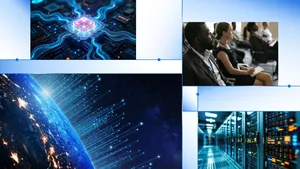Google’s partnerships with international organizations
Whether it’s a pandemic, climate change, or the health of the global economy, many of the problems of our era can only be effectively addressed by collaboration across borders. In an interconnected world, such collaboration depends on international organizations that bring together governments, the private sector and civil society. And we think technology can help.
We’ve recently seen how technology-enabled solutions like smartphone-based exposure notifications can support public health authorities in the fight against COVID-19, machine-learning models can reduce energy consumption, and AI can address cybersecurity challenges posed by hackers and spam. We at Google are proud to be investing billions in R&D each year to innovate new technologies to help address the world’s biggest cross-border problems.
To be sure, our relationship with international institutions is a two-way street. Our development of new technologies is guided by multilateral frameworks like the United Nations (UN) Roadmap for Digital Cooperation, the UN Sustainable Development Goals and the UN Guiding Principles on Business and Human Rights. More broadly, we, like every company, benefit from the good work done by institutions ranging from the World Health Organization (WHO) to the World Bank in securing public health, strengthening the global economy and resolving conflict. And we value international organizations' ability to shape global agendas and drive multi-stakeholder consensus — like how the OECD is working to reform global tax regimes or the World Trade Organization is working to promote a framework for digital trade.
This year, Google’s plan is to accelerate our partnerships with international organizations on four fronts.
1. Slowing the pandemic and supporting economic recovery. At the beginning of the pandemic, we wanted to help people find answers by surfacing critical information and leading global initiatives like “Do the Five” and “Wear a Mask.” For the first time, we partnered with the WHO to run public service health announcements through Google Search and YouTube. This partnership has led to campaigns in more than 100 countries and has driven over 1 billion ads served (impressions, or views) and 115 million clicks to the WHO website, educating users about the disease and fighting the infodemic. In recent months, we’ve turned our focus to helping millions of people around the world acquire the necessary skills to participate in the post-pandemic digital economy, and we’ll continue to support digital transformation of economies and communities to ensure that we step back into a stronger, resilient and more inclusive world.
2. Artificial intelligence and innovation. Building off our longstanding support for the UN Sustainable Development Goals (SDGs), we will continue to work with UN agencies to develop AI in a way that meaningfully improves people’s lives. For example, we’ve partnered with the UN World Food Programme to develop an AI-enabled tool to improve the delivery of disaster aid, and with UN-ESCAP and the Association of Pacific Rim Universities to launch an AI for Social Good report. We believe AI can be a transformational tool to support the goals of multilateral institutions.
3. Sustainability. Sustainability has been a core Google value since our founding. Now in our third decade of climate action, we’re working to help fulfill the vision of the UN SDGs and the Paris Agreement, becoming the largest annual corporate purchaser of renewable energy and committing to operate 24/7 on carbon-free energy by 2030. But we are also taking action far beyond our own operations, working with international organizations like the UN Framework Convention on Climate Change (UNFCCC) to create tools like the Environmental Insights Explorer and our breakthrough AI for building energy efficiency that help everyone move towards a carbon-free world.
4. Open internet and human rights. The advent of the internet a generation ago fast-tracked human rights around the world in a way history had never seen. Google's commitment to human rights, including to the UN Guiding Principles on Business and Human Rights, dates back to our earliest years. Cognizant of the alarming realities behind the gendered impact of the pandemic, we have had a particular focus on gender equality. That's why Google joined the Generation Equality Forum as a member of the Action Coalition for Technology and Innovation for Gender Equality; our Ad Grants partnership with UN Women has already enabled over seven million public service announcements in over 237 countries, raising awareness of the outsized impact of COVID-19 on women and girls. This year we also launched the Google.org Impact Challenge for Women and Girls, a first-of-its-kind program to empower women and girls to reach their full economic potential.
While we accelerate our work in these four areas, Google is committed to supporting international organizations to tackle the next generation of cross-border challenges that lay over the horizon. In an era of growing skepticism of government institutions, that starts by rebuilding trust and consensus in the value of working globally to solve problems.
As a technology company inspired by the power of human resilience, we can think of no better way to honor the setbacks, sacrifices and hardships of a battle-wearied world than to work with organizations committed to helping everyone — and doing our part by building the tools and technologies to make their vision possible.






